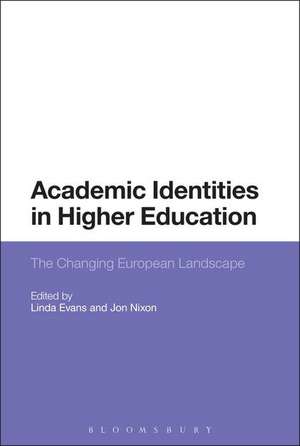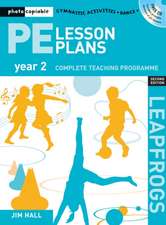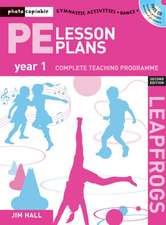Academic Identities in Higher Education: The Changing European Landscape
Editat de Professor Linda Evans, Professor Jon Nixonen Limba Engleză Hardback – 22 apr 2015
| Toate formatele și edițiile | Preț | Express |
|---|---|---|
| Paperback (1) | 258.42 lei 6-8 săpt. | |
| Bloomsbury Publishing – 14 dec 2016 | 258.42 lei 6-8 săpt. | |
| Hardback (1) | 774.86 lei 6-8 săpt. | |
| Bloomsbury Publishing – 22 apr 2015 | 774.86 lei 6-8 săpt. |
Preț: 774.86 lei
Preț vechi: 1113.56 lei
-30% Nou
Puncte Express: 1162
Preț estimativ în valută:
148.27€ • 161.56$ • 124.94£
148.27€ • 161.56$ • 124.94£
Carte tipărită la comandă
Livrare economică 23 aprilie-07 mai
Preluare comenzi: 021 569.72.76
Specificații
ISBN-13: 9781472579508
ISBN-10: 147257950X
Pagini: 288
Dimensiuni: 156 x 234 x 18 mm
Greutate: 0.58 kg
Editura: Bloomsbury Publishing
Colecția Bloomsbury Academic
Locul publicării:London, United Kingdom
ISBN-10: 147257950X
Pagini: 288
Dimensiuni: 156 x 234 x 18 mm
Greutate: 0.58 kg
Editura: Bloomsbury Publishing
Colecția Bloomsbury Academic
Locul publicării:London, United Kingdom
Caracteristici
An emphasis on scholarly and research-based insider accounts by academic practitioners - located in different fields and disciplines - of their own and others' identity formation
Notă biografică
Linda Evans is Professor of Leadership and Professional Learning at the University of Leeds, UK, and has previously worked at the University of Warwick, UK.Jon Nixon is Honorary Professor in the Center for Lifelong Learning Research and Development at the Hong Kong Institute of Education, Hong Kong, and Visiting Professor at Middlesex University, UK.
Cuprins
Notes on ContributorsAcknowledgementsIntroduction: Identities in transition - perspectives, trajectories and reformations, Jon Nixon (Hong Kong Institute of Education, Hong Kong)Part I: Frameworks and perspectives1. The academic condition: Unstable structures, ambivalent narratives, dislocated identities, Niilo Kauppi (French National Centre for Scientific Research, France)2. Autonomisation and individualisation: Ideational shifts in European higher education, Tero Erkkila (University of Helsinki, Finland) and Ossi Piironen (University of Helsinki, Finland)3. Academic identity formation: Reframing the long shadow of Europe, Terri Seddon (Monash University, Australia)Part II: Academic trajectories4. Swiss higher education: A particular showcase at the heart of the European landscape, Nicole Rege Colet (University of Strasbourg, France)5. Academic identity in Slovakia: A personal comparative view, Stefan Benus (Constantine the Philosopher University in Nitra, Slovakia)6. The Scholarship of academic entrepreneurship in 21st century Europe: A Swedish relief carved from personal experiences, Eva M. Brodin (Lund University, Sweden)7. Predicaments of fusion and transformation: A journey from Georgia, Liana Beattie (Edge Hill University, UK)8. Competitiveness, elitism and neoliberal performativity policy: The formation of a Russell Group academic identity, Linda Evans (University of Leeds, UK)Part III: Formations and re-formations90. The challenges of the French 'homo academicus': Modernization, identities and the sense of justice, Romuald Normand (University of Strasbourg, France)10. High-flyers and underdogs: The polarisation of Finnish academic identities, Oili-Helena Ylijoki (University of Tampere, Finland) and Jani Ursin (University of Jyväskylä, Finland)11. The changing conditions of academic identity: The Portuguese open university, Darlinda Moreira (Universidade Aberta, Portugal), Luisa Lebres-Aires (Universidade Aberta, Portugal) and Susana Henriques (Universidade Aberta, Portugal)12. Policy, profession and person: The formation of reflexive academic identities in an Irish Institute of Technology, Carol O'Byrne (Waterford Institute of Technology, Republic of Ireland)13. Regulations, economics and the sociocultural: Academic identity formation in Greek higher education, Antigoni Papadimitriou (University of Oslo, Norway) Reflections: Academic identity and the changing European landscape, Linda Evans (University of Leeds, UK) Index
Recenzii
In Academic Identities in Higher Education we are treated to a wonderfully accessible set of essays - most with an autobiographical component - by academics right across Europe. Implicitly and intriguingly, this volume opens the possibility that, for all of the instability in its formation, we may be seeing the emergence of a European academic identity. This is a special book and is essential reading for all those interested in academic identity, and I recommend it wholeheartedly.
This book is a thoughtful and wide-ranging analysis of the multiple and complex institutional, sociocultural and political contexts that influence and shape academics and their work. Linda Evans and Jon Nixon have assembled an authoritative group of scholars who trace the varying impacts of major structural developments and institutional changes in higher education. Each author presents a compelling account of the temptations, tensions and challenges of being an academic in 21st century Europe. This collection is an informed, scholarly and critical contribution to current debates swirling in higher education and a valuable resource for the international higher education research community.
This insightful and thought-provoking collection narrates the seismic shifts in European higher education and the jarring impacts on academic identity. The reflections-some deeply personal-attest to the resilience of individuals in times of stress and dislocation.
A critical achievement and a polyphonous historical testimony of the transformations of European universities and higher education institutions at the beginnings of the 21th century. The authors of Academic Identities in Higher Education provide a reflexive compass for academics to navigate between their shifting roles as scholars, educators, intellectuals, researchers and advisors. They analyse how the structural changes in higher education across Europe towards more competitive and individualized forms of organizing intellectual work affect the core values of teaching and research and set them under pressure. The book offers glimpses of hope for European academics to emerge as nomadic identities with far-reaching intellectual horizons, being truly cosmopolitan agents of learning.
As universities evolve to accommodate increasingly market-driven agenda, this collection offers timely reassurance of the shared values and professional practices that unite colleagues from across European higher education systems. Amid reform, austerity and stratification, it is a pleasure to be reminded of what it means to be an academic.
This book is a thoughtful and wide-ranging analysis of the multiple and complex institutional, sociocultural and political contexts that influence and shape academics and their work. Linda Evans and Jon Nixon have assembled an authoritative group of scholars who trace the varying impacts of major structural developments and institutional changes in higher education. Each author presents a compelling account of the temptations, tensions and challenges of being an academic in 21st century Europe. This collection is an informed, scholarly and critical contribution to current debates swirling in higher education and a valuable resource for the international higher education research community.
This insightful and thought-provoking collection narrates the seismic shifts in European higher education and the jarring impacts on academic identity. The reflections-some deeply personal-attest to the resilience of individuals in times of stress and dislocation.
A critical achievement and a polyphonous historical testimony of the transformations of European universities and higher education institutions at the beginnings of the 21th century. The authors of Academic Identities in Higher Education provide a reflexive compass for academics to navigate between their shifting roles as scholars, educators, intellectuals, researchers and advisors. They analyse how the structural changes in higher education across Europe towards more competitive and individualized forms of organizing intellectual work affect the core values of teaching and research and set them under pressure. The book offers glimpses of hope for European academics to emerge as nomadic identities with far-reaching intellectual horizons, being truly cosmopolitan agents of learning.
As universities evolve to accommodate increasingly market-driven agenda, this collection offers timely reassurance of the shared values and professional practices that unite colleagues from across European higher education systems. Amid reform, austerity and stratification, it is a pleasure to be reminded of what it means to be an academic.











